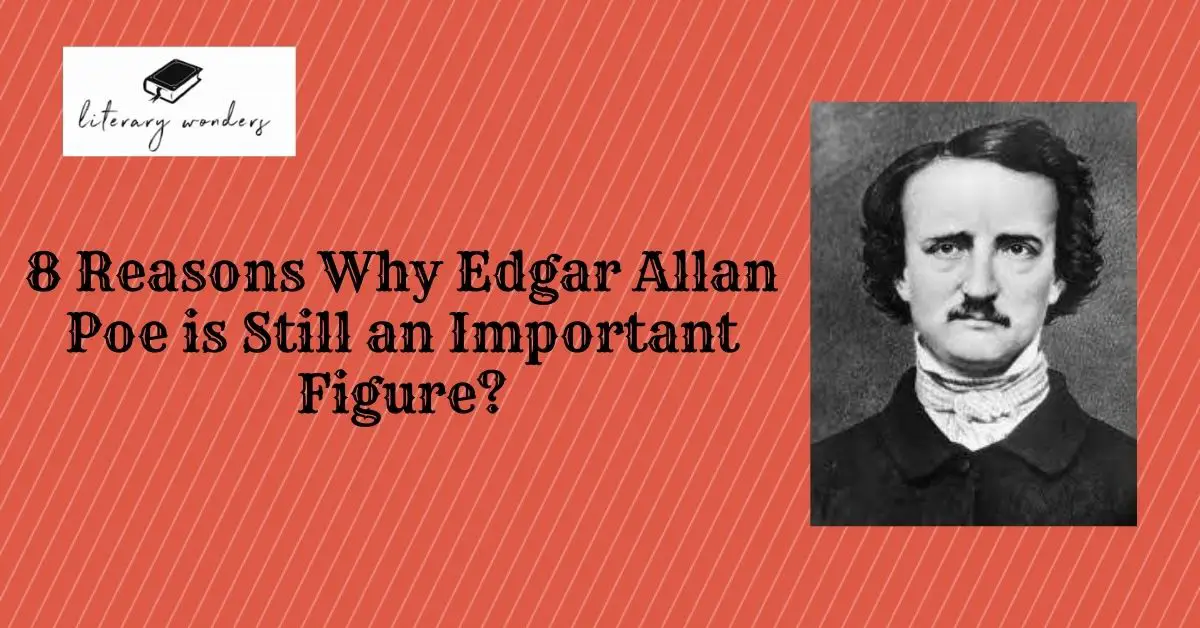
The article, 8 Reasons Why Edgar Allan Poe is Still an Important Figure, will provide you with remarkable details about Poe’s life and how his exceptional writings won him accolades. Edgar Allan Poe (January 19, 1809 – October 7, 1849) was an American author, poet, editor, and literary critic, considered part of the American Romantic Movement.
Best known for his tales of mystery and the macabre, Poe was one of the earliest American short story practitioners and is considered the inventor of the detective fiction genre. He is further credited with contributing to the emerging genre of science fiction. He was the first well-known American writer to earn a living through writing alone, although he was unsuccessful in his lifetime.
Despite being one of the most influential writers of his time, Edgar Allan Poe has largely been left in the shadows by history. While many people are familiar with his poetry and short stories, most don’t know about his accomplishments as an author and poet or recognize his general contributions to literature. Below are eight reasons explaining why Poe is still famous?
1. He wrote short stories
Today’s fiction writers owe a debt of gratitude to Poe. Before him, most literature was long and epic. Readers often had to get through dozens of pages before getting hooked on a story or character. Poe changed all that with his short stories. Today, it would be unheard of for a novel to come out in monthly installments, but readers can thank Poe for making it popular.
Without Poe, we might never have heard of Sherlock Holmes or Nancy Drew, and although he wasn’t exactly a warm-and-fuzzy guy himself, he showed us what could happen when artists use their talents to appeal to mass audiences. It’s still common practice today and has made many authors famous around the world.
2. He revolutionized detective stories
From stories like The Murders in the Rue Morgue to The Purloined Letter, Poe’s influence on detective fiction can’t be overstated. His innovative approach—using dénouement, or reasoning through multiple possibilities to solve a crime—set up later authors like Arthur Conan Doyle and Agatha Christie. Without him, Sherlock Holmes may have never existed. And while writers are still bringing their own twists to the genre today (think Truman Capote’s In Cold Blood), it all has its roots in Poe’s ground-breaking contributions.
He was one of America’s first literary voices: Before his life ended at age 40, Poe wrote hundreds of poems and short stories that have cemented his place as one of America’s greatest writers. More importantly, for literature as a whole, he published most of them himself via subscription. He made himself famous by using his self-promotion skills to build public interest before anyone else did—and was wildly successful for it.
3. He was an essayist
Edgar Allan Poe may be best known for his poetry and macabre fiction, but he was also a published essayist. In A Chapter on Autography, he analyzed handwriting as both art and science—he called it autography to make it sound like a formalized discipline, which in many ways, it is. He goes into extensive detail about reading a person’s character by observing their penmanship. He saw handwriting as being more than just something we do with our hands—it was a window into our souls.
If you’re wondering why poet still matters (and if you aren’t, you probably should be), here’s your answer: because even though he lived before computers and word processors became commonplace, his theories are still valuable today.
4. His family life inspired his writing
Poems such as The Raven and Annabel Lee are often assumed to be inspired by his relationship with Virginia Clemm, who died in 1847 at age 24. They married when she was 13, and he was 27, though it’s unknown how long they were together before marrying; she may have been a source of inspiration for many of his poems.
For example, Poe wrote a poem about her called Lenore, which in part reads: But we loved with a love that was more than love — / O, beyond all human estimate! This makes him one of the first American writers to show passion in his writing; most early American literature focused on telling compelling stories without elaborating on real-life relationships.
5. His writing set the stage for modern horror
The Fall of the House of Usher is widely considered to be one of Poe’s best, and with good reason. It set much of what we consider to be horror apart from terror, and really established just how important setting can be in a story.
His themes are so universal that they have been revisited repeatedly since their initial appearance: Fear of abandonment, loss, identity and insanity permeate his work and resonate with people long after they’re read.
6. He invented and named genres
Poe invented both science fiction and detective fiction. While his first stories fit into more recognizable genre categories, it was Poe who gave science fiction its name and who wrote many of its first works of literature.
Moreover, he created several genres that weren’t named until later; for example, he was among those who started using gothic in a literary sense, setting off a surge in gothic horror writing (but not calling it gothic). He invented his own names for new forms of poetry: This one’s less impressive than some of the others, but still interesting.
7. His poetry broke barriers in style and form
Even if you’ve never heard of Edgar Allan Poe, chances are you’ve read his work. In fact, there’s a good chance you know one of his most famous poems by heart. Though today he’s best known for his dark and creepy short stories and poems, at that time he was better known for his distinctive literary style.
His poems were full of symbolism, which had never been seen before in verse. They were written to sound as if they had multiple meanings at once—like poetry that could be read both forward and backward. His works have inspired generations of authors from Fyodor Dostoyevsky to Charles Baudelaire to Hunter S. Thompson.
8. His writing has influenced many famous writers
In today’s world, readers are bombarded with media and entertainment options. Edgar Allan Poe might not be high on everyone’s list of favorite writers, but his influence on literature can’t be denied. Writers such as Nathaniel Hawthorne (The Scarlet Letter), Oscar Wilde (The Picture of Dorian Gray), and Charles Dickens (The Pickwick Papers) used elements of Poe’s style in their own writing. Because of Poe, these authors had a style to imitate and from which to learn. Today, some contemporary horror novels still borrow from or pay homage to his works; authors such as Stephen King have admitted that they are heavily influenced by him.
Suggested Articles: https://literarywonders.com/what-is-the-theme-of-ode-to-a-grecian-urn/

